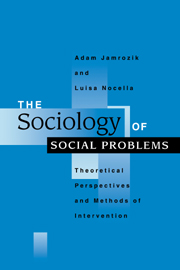Book contents
- Frontmatter
- Contents
- List of Tables
- List of Figures
- Preface and Acknowledgements
- 1 Introduction: Theoretical Perspectives on Social Problems
- 2 Contemporary Perspectives on Social Problems
- 3 Methods of Intervention in Social Problems
- 4 Social Actors in Social Problems
- 5 Challenges of Contemporary Social Problems
- 6 Social Problems in the Residualist Conversion Perspective
- 7 Inequality – The Underlying Universal Issue in Social Problems
- 8 The Social Construction of Family Problems
- 9 The Problem of Social Order
- 10 The Theory of Residualist Conversion: Does it Meet the Test?
- 11 Conclusions and Implications
- Bibliography
- Index
5 - Challenges of Contemporary Social Problems
Published online by Cambridge University Press: 29 March 2011
- Frontmatter
- Contents
- List of Tables
- List of Figures
- Preface and Acknowledgements
- 1 Introduction: Theoretical Perspectives on Social Problems
- 2 Contemporary Perspectives on Social Problems
- 3 Methods of Intervention in Social Problems
- 4 Social Actors in Social Problems
- 5 Challenges of Contemporary Social Problems
- 6 Social Problems in the Residualist Conversion Perspective
- 7 Inequality – The Underlying Universal Issue in Social Problems
- 8 The Social Construction of Family Problems
- 9 The Problem of Social Order
- 10 The Theory of Residualist Conversion: Does it Meet the Test?
- 11 Conclusions and Implications
- Bibliography
- Index
Summary
Social problems, like all social phenomena, occur in the context of a particular time and place, and have to be perceived in that perspective. This is the approach used in the overview of perspectives on social problems in Chapter 2. The perspectives examined in that chapter vary in their degree of theoretical abstraction and generalisation, but have one feature in common – namely, that they were formulated from empirical observations in one particular society, the United States. They were also formulated over the period of a century, and each perspective reflects the issues as well as the sociological interests of a particular period. This does not mean these perspectives are not applicable to the study of social problems in other societies or even to the study of contemporary issues, but the context of time and place in their origins needs to be kept in mind. Indeed, there has been acknowledgement in recent years among American sociologists themselves of an existing parochialism in the American social sciences. Although comparative international research has been encouraged, research questions and data analysis still rely heavily on American theoretical frameworks and there is a serious lack of cross-cultural components in sociology curricula (Santiago 1993:207).
As we approach the end of one millennium and the beginning of another, more and more problems that may be called ‘social’ are of global proportions, or at least of global significance.
- Type
- Chapter
- Information
- The Sociology of Social ProblemsTheoretical Perspectives and Methods of Intervention, pp. 78 - 102Publisher: Cambridge University PressPrint publication year: 1998



